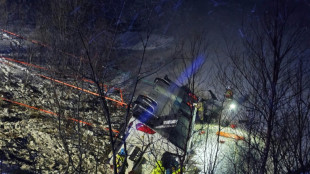
-
 South Korea's acting president faces impeachment vote
South Korea's acting president faces impeachment vote
-
Fleeing Myanmar, Rohingya refugees recall horror of war

-
 Smith century puts Australia in control of 4th Test against India
Smith century puts Australia in control of 4th Test against India
-
Israeli strikes hit Yemen as Netanyahu fires warning

-
 Peru ex-official denies running Congress prostitution ring
Peru ex-official denies running Congress prostitution ring
-
Australia's Smith reaches 34th Test century

-
 NHL Red Wings fire Lalonde and name McLellan as head coach
NHL Red Wings fire Lalonde and name McLellan as head coach
-
Injured Halep withdraws from Australian Open

-
 Liverpool power seven points clear, Man Utd crash at Wolves
Liverpool power seven points clear, Man Utd crash at Wolves
-
Leaders Liverpool survive Leicester scare to go seven points clear

-
 Membership of UK's anti-immigration Reform party surpasses Conservatives
Membership of UK's anti-immigration Reform party surpasses Conservatives
-
Two dead in treacherous Sydney-Hobart yacht race

-
 Amorim warns of 'long journey' ahead for miserable Man Utd
Amorim warns of 'long journey' ahead for miserable Man Utd
-
Three dead, four injured in Norway bus accident

-
 Man Utd fall to Wolves as Fernandes sees red
Man Utd fall to Wolves as Fernandes sees red
-
Fernandes sent off as Man Utd crash at Wolves, troubled Man City held by Everton

-
 'Logical' that fatigued Spurs are faltering - Postecoglou
'Logical' that fatigued Spurs are faltering - Postecoglou
-
Manmohan Singh: technocrat who became India's accidental PM

-
 India's former PM Manmohan Singh dies aged 92
India's former PM Manmohan Singh dies aged 92
-
Acid risk contained in deadly Brazil bridge collapse

-
 Chelsea stunned by Fulham in blow to Premier League title hopes
Chelsea stunned by Fulham in blow to Premier League title hopes
-
Troubled Man City held by lowly Everton, Chelsea title bid rocked

-
 Paterson, Bosch give South Africa edge over Pakistan in first Test
Paterson, Bosch give South Africa edge over Pakistan in first Test
-
Oil leak in Peru tourist zone triggers 'environmental emergency'

-
 Mozambique post-election violence kills 125 in three days: NGO
Mozambique post-election violence kills 125 in three days: NGO
-
Finns probing ship from Russia for 'sabotage' of cables

-
 Williams hits unbeaten 145 as Zimbabwe make Afghanistan toil
Williams hits unbeaten 145 as Zimbabwe make Afghanistan toil
-
Bowlers bring Pakistan back into first Test in South Africa

-
 Banbridge foils French to land King George VI Chase for Ireland
Banbridge foils French to land King George VI Chase for Ireland
-
Man City pay penalty for Haaland miss in Everton draw

-
 Paterson takes five wickets as Pakistan bowled out for 211
Paterson takes five wickets as Pakistan bowled out for 211
-
Kremlin cautions on 'hypotheses' over plane crash

-
 Pakistan military convicts 60 more civilians of pro-Khan unrest
Pakistan military convicts 60 more civilians of pro-Khan unrest
-
Turkey lowers interest rate to 47.5 percent

-
 Syria authorities launch operation in Assad stronghold
Syria authorities launch operation in Assad stronghold
-
Record number of migrants lost at sea bound for Spain in 2024: NGO

-
 Kohli called out over shoulder bump with Konstas during fourth Test
Kohli called out over shoulder bump with Konstas during fourth Test
-
Rural communities urged to flee east Australia bushfire

-
 Sri Lanka train memorial honours tsunami tragedy
Sri Lanka train memorial honours tsunami tragedy
-
S. Korea's opposition moves to impeach acting president

-
 'We couldn't find their bodies': Indonesian tsunami survivors mourn the dead
'We couldn't find their bodies': Indonesian tsunami survivors mourn the dead
-
Lakers pip Warriors after another LeBron-Curry classic

-
 India readies for 400 million pilgrims at mammoth festival
India readies for 400 million pilgrims at mammoth festival
-
Nepal hosts hot air balloon festival

-
 Asia stocks up as 'Santa Rally' persists
Asia stocks up as 'Santa Rally' persists
-
Tears, prayers as Asia mourns tsunami dead 20 years on

-
 Sydney-Hobart yacht crews set off on gale-threatened race
Sydney-Hobart yacht crews set off on gale-threatened race
-
Key public service makes quiet return in Gaza

-
 Fearless Konstas slams 60 as Australia take upper hand against India
Fearless Konstas slams 60 as Australia take upper hand against India
-
Hungry Sabalenka ready for more Slam success


Top climate fundraiser offers defense of disruptive protests
For years, Margaret Klein Salamon labored behind the scenes to try to convince politicians about the existential threat posed by climate change.
Today, she has changed her approach: the American activist is in charge of a fund that exclusively finances groups engaging in civil disobedience.
It's the "most effective way to change policy fast, and public opinion," the 37-year-old New Yorker told AFP during an interview in her Brooklyn neighborhood.
Salamon is the executive director of the Climate Emergency Fund, which was founded in 2019 by the filmmaker Rory Kennedy -- niece of the late president -- and Getty family heiress Aileen Getty.
Its board of directors includes Adam McKay, director of the satirical film about climate, "Don't Look Up," who is also the biggest donor.
In 2022, the fund distributed $5 million to groups such as Just Stop Oil, Extinction Rebellion, Scientist Rebellion, and more.
These are the groups behind some of the most eye-catching recent climate protests: gluing their hands to roads or airport runways, disrupting sports events or throwing soup or paint at works of art protected by glass.
Such actions have drawn anger and accusations of harming the wider cause.
But Salamon, author of "Facing the Climate Emergency," stands by the headline-grabbing protests.
"Social science and history both are very clear, that disruptive activism is the fastest way to create transformative change," says the Harvard graduate.
"Which tactics of the civil rights movement or the suffragettes or the AIDS movement went too far?" she argues, provocatively.
For her, the arguments against just don't hold water. "I would like to actually hear from someone who says, 'I used to care about climate change, but now that these protesters have used these tactics, I no longer do.'"
- 'Emergency mode' -
The goal, she says, is to make the issue as visible as possible, so that it is present in the minds of voters. And to broaden a sense of "climate emergency," that she believes is "contagious."
"Humans evaluate risk socially, not rationally," explains the trained psychologist, who made a complete career shift shortly after witnessing the devastation caused by Hurricane Sandy in New York City in 2012.
For example if a fire alarm goes off in an office, people take their cues from others and generally stay calm and assume it's a drill, unless told emphatically otherwise, particularly by someone in leadership.
Such mass awareness can happen "pretty quickly," she argues, and trigger a shift into "emergency mode."
That's what it'll take for a massive mobilization of resources she believes, like what happened during the Second World War or during the Covid pandemic.
Activists want to break the "mass delusion of normalcy" among those members of the public that remain passive and disengaged.
They're also targeting the decision-makers themselves, with very concrete results, she argues.
Joe Manchin, a US senator whose vote was key to passing Joe Biden's signature climate law, was followed by protesters for months, blocking his car, his boat, and more. The fund spent around $200,000 to support them.
Salamon is under no illusion that the protests alone were enough to sway the West Virginia lawmaker. But even if they were "two percent of the reason," for passage of the Inflation Reduction Act, which comes with $370 billion in climate investments, "just think about that return on investment."
- 'Not a popularity contest' -
While there has been a large influx of money into the climate space, not enough has been directed towards activism, warns Salamon.
What she calls the "reformist gradualist movement," that works "within the system" and is embodied by groups like Greenpeace, has been the dominant force for decades.
But for new groups, she quickly became aware of the significance of fundraising -- "a very unpopular" role, in her words, but one in which she found herself to be highly effective.
Ironically, she's not personally drawn to protests. Having never been arrested, she says she has nothing but admiration for the "incredibly brave" demonstrators on the ground, some of whom have gone to prison.
She condemns growing repression by governments towards climate dissidents, stressing that the groups supported by the Climate Emergency Fund are committed to being nonviolent.
But she's not worried if public sentiment isn't always in favor. "It's not a popularity contest," she says.
"We're sleepwalking off of a cliff -- and the activists are shaking us, trying to wake us up," she says. No one likes being shaken, but inaction will lead to a far worse outcome.
L.Henrique--PC



